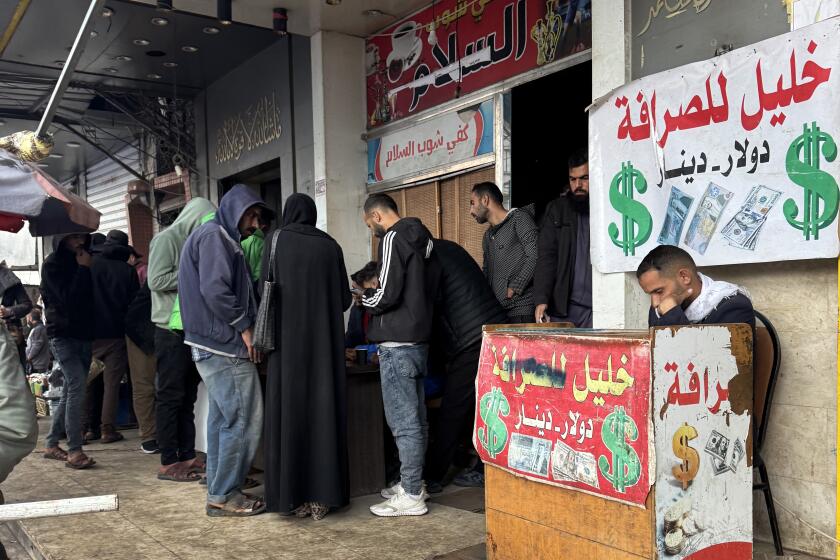Bosnia’s Serbs and Muslims Swap 100 Prisoners : Balkans: Exchange is only element of current cease-fire pact to be fulfilled so far. Elsewhere, violations continue.
- Share via
SARAJEVO, Bosnia-Herzegovina — On his first day of freedom after months inside a Serbian prison, Raif Hodzic wept Saturday as he remembered the terrifying torture that he was sure would end his life.
Despite the treatment he received, the 64-year-old retired railway worker spoke with an optimism baffling to an outside world that is watching as Bosnia’s latest truce crumbles.
“I still have hope that we will have a chance to live as one, united,” said Hodzic, a Bosnian Muslim captured by Serbs when he tried to visit his family in Sarajevo. “This cannot go on forever.”
Hodzic, seated in stocking feet on the floor of his daughter’s apartment and surrounded by relieved relatives sipping Turkish coffee, gained his freedom in the first prisoner exchange carried out by Bosnia’s rebel Serbs and the Muslim-dominated government as part of a four-month cease-fire agreement signed Dec. 31.
The release of 100 prisoners late Friday represents the only element in the agreement to be fulfilled thus far. There have been repeated violations of the cease-fire and continued disputes over the promised reopening of roads into Sarajevo and the establishment of a demilitarized zone south of the capital.
The U.N.-brokered agreement had raised a modicum of hope of an end to Europe’s deadliest conflict since World War II. But it has been imperiled from the start.
Indeed, even as the prisoners were being freed, a firefight broke out between government and rebel Serb forces in the Serb-held suburb of Grbavica, a short distance from the site of the exchange.
Three soldiers--two Serbs and one from the government army--were wounded in the fighting, which U.N. officials said constituted the most serious cease-fire violation in the besieged capital.
The U.N. officials blamed Bosnian government forces for opening fire, and the incident escalated as the Serbs responded several hours later.
“It goes to show you what one incident can spark,” U.N. spokesman Lt. Col. Gary Coward said.
Hopes of peace were further jeopardized by the continued shelling of Bihac, the Muslim-dominated “safe area” in northwestern Bosnia where Bosnian government forces are battling anti-government Muslims and their Croatian Serb allies. However, the attacks were reported to have diminished by Saturday in comparison to heavy bombardment earlier in the week.
With the cease-fire in such disarray, the prisoner swap emerged as the single sign of progress. Each of the factions may have gone ahead with the release in an attempt to boost morale among its civilian population. An estimated 1,500 people are still being held as war prisoners in Bosnia, according to the International Red Cross.
The exchange took place along the snow-covered Bridge of Brotherhood and Unity, which divides government- and Serb-controlled segments of Sarajevo. Darkness and a thick fog settled over the exchange, which was delayed about five hours as anxious relatives waited, huddled in the cold.
There, Hodzic was reunited with his daughter and grandson.
“I am aware I was born only once, but I now believe I was allowed to live twice,” he said.
Hodzic fell into enemy hands when he traveled here from his home in Tuzla, 50 miles north of Sarajevo, to see his family and the grave of his son, a soldier killed in fighting two years ago. He sneaked through a semi-secret tunnel that passes into Sarajevo under enemy lines and is used by Bosnians to smuggle people and goods into the capital.
Emerging disoriented, however, Hodzic wandered into Serb-held territory and was captured and hauled off to a tiny, dark cell.
Thin, grizzled but in good condition, Hodzic can now recount each day of his detention with acute detail--the times he was forced to lie in urine, or when Serbian prisoners beat him with logs, or when a guard tried to burn his face with a lighter. “You Muslims should not exist anymore,” an officer who helped run the jail told him. “You can go to Iraq or to Turkey.”
Hodzic said one particularly sadistic warden told him to prepare to be shot to death and ordered him into a dungeon. Certain he was going to die, Hodzic was knocked unconscious. But he awoke later to find he had been spared.
Hodzic said he was eventually transferred to a better prison, where he was given medical treatment and the guards left him alone. The mother of one of the guards sent him spinach pies, which are typical food in Bosnia for Serbs and Muslims.
Hodzic’s release was obtained in part thanks to daily lobbying by his daughter, who appealed to the government prisoner-of-war committee that drew up the list of men included in Friday’s exchange.
One of the numerous hitches that delayed the transfer came when a prisoner on the Serbian side changed his mind and refused to return home. Angered by the man’s change of heart, Maor Masovic, head of the government prisoner committee, ordered that one Serb who was to be released be held instead. This lowered the number of freed prisoners from 102 to 100, according to Nina Winquist, a spokeswoman for the Red Cross. The last prisoner swap, involving 295 captives, took place Oct. 6.
More to Read
Sign up for Essential California
The most important California stories and recommendations in your inbox every morning.
You may occasionally receive promotional content from the Los Angeles Times.











